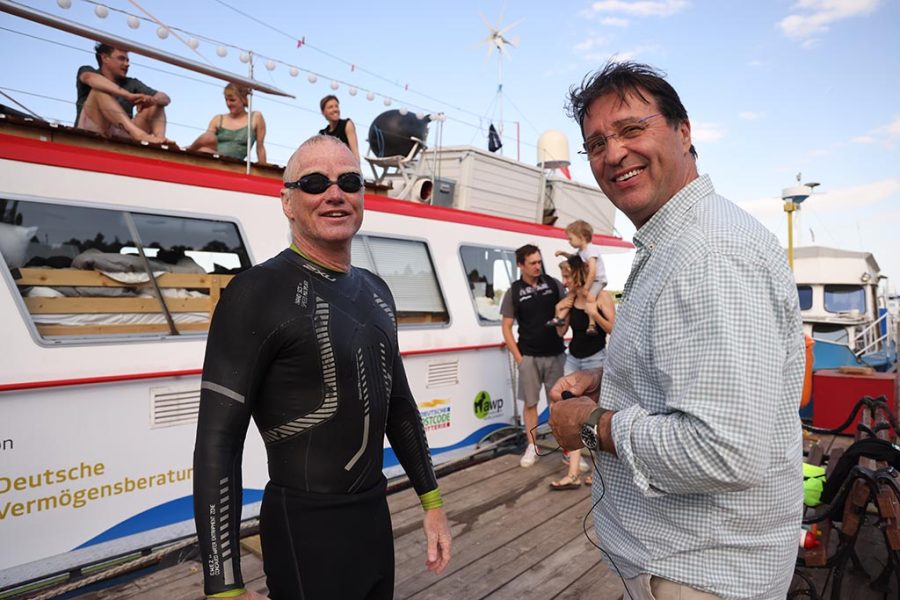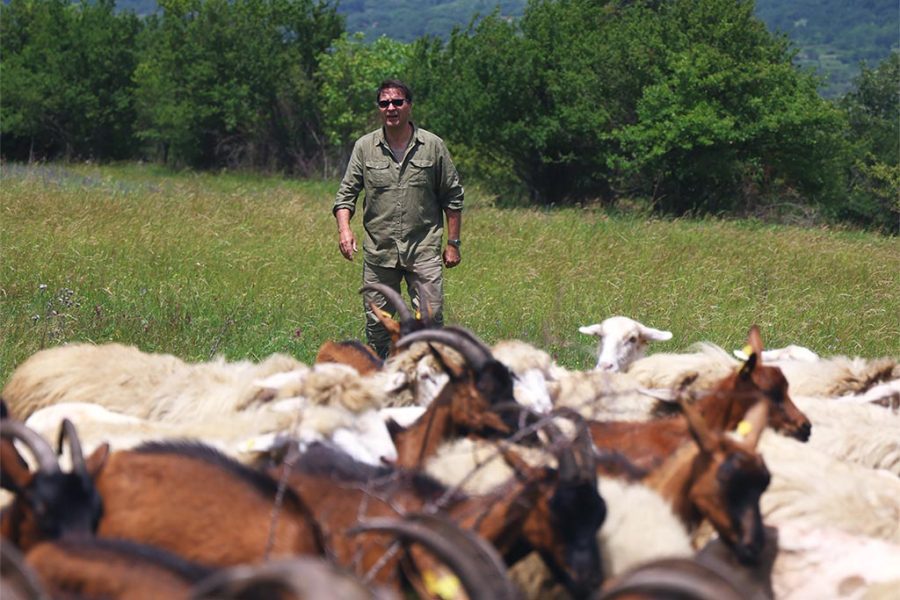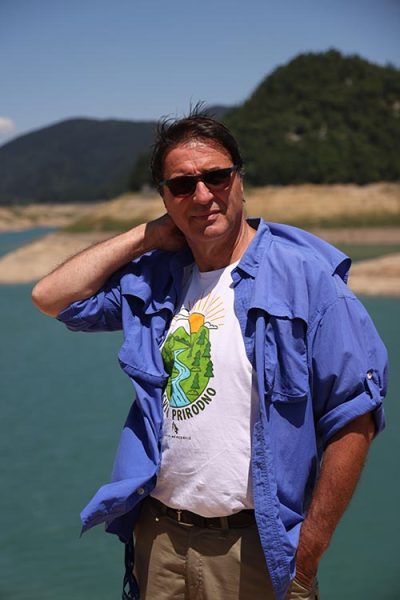He is fortunate enough to be doing a job that he loves. And for him and what he does to be loved by the audience. In the popularity and appreciation rankings of television creators, he is at the very top. His show Sasvim Prirodno [Completely Natural] is a unique documentary testimonial about the beauty of nature and the struggles of life in it. But who really is this tireless enthusiast and investigator who keeps viewers riveted to the small screen and tuned to RTS channel 1?
Undoubtedly the greatest living screenwriter of television shows that have occupied our small screens for decades – Better Life, Hot Wind, Happy People etc. – is Siniša Pavić, who is today still with us at the age of 90. He remains sharp witted and is an interesting interlocutor. He recently told the author of this article that he no longer really watches television because there’s nothing to watch, but he never misses the shows of Jovan Memedović, because they present the only ’normal life’ that can be found on the box today.
I’ve chosen this Sinisa Pavić statement to introduce this interview with Jovan Memedović (63), the only television journalist in the country to have long since outgrown that role and become a kind of national treasure, because he’s placed his knowledge, work and efforts in the service of preserving nature and healthy living in Serbia. He has been explaining and demonstrating for years, or more precisely decades, that there can be no strong Serbia without strong rural communities, because Serbia dies when its villages die. His most beloved comments are those that come from viewers, because he is equally good at conversing with everyone.
“I’m only incapable of conversing with politicians. I encounter them, they want to tell me something, they sometimes insist that we meet up for a chat. However, I realised long ago that they come from a completely different world and that I don’t even know how to talk with them. It is similar with civic structures in smaller towns. Fortunately, I collaborate very well with everyone else. With the villagers I’m instantly a brother, a first cousin. And I try to help them in every way I can. The common man has been sadly neglected.”
Our eye no longer recognises the wilderness as an environment, but rather sees it as a danger. For city folk, the wilderness is already a potential danger
When he cruises around the country, he notices the negative consequences of our poor conduct in the natural world. And he loudly tries to draw attention to that, often going far beyond the producing of a TV natestimonial. Around a year ago, for example, he brought together volunteers to clean Lake Perućac. They packed bags with tons of rubbish and leftovers that had been dumped in and around this gem of the Drina river canyon.
He recently quit his job after a 30- year career at national public broadcaster Radio-Television of Serbia, but RTS continues to air his shows – the top-rated Sasvim Prirodno [Completely Natural] and the franchised game show The Chase. Apart from being widely renowned for his work, Memedović is also a favourite among the country’s ladies, just like the former most famous presenter of TV Belgrade, Miloje Mića Orlović (1934-2013). He is also loved by animals, which I witnessed myself when watching him pet his white husky in the garden of Vračar’s Monks Bar, where we sat and talked. Of everyone sitting in the garden, the dog only approached his master.

Jovan’s early career interests were largely determined by his Montenegrin origins, with his father hailing from the Drobnjak area of mount Durmitor and his mother originally from Cetinje. They both died relatively young, but they first prepared him well enough to handle life. He says that he first fell in love with nature as a child.
“As my parents are both from Montenegrin regions, I spent my summer holidays mostly by the sea, with my mother’s relatives in the Bay of Kotor, or on Durmitor. At the seaside I fished, while on the mountain I helped my relatives with all the household chores and their livestock. Those two interests later followed me throughout my entire life.”
He completed the 4th Belgrade Gymnasium grammar school and lower music school, competed in judo for many years, and graduated from the University of Belgrade Faculty of Sport and Physical Education. During his studies, he had a mandatory course that included spending ten days camping in nature, and it was then that he experienced his self-discovery. He discovered the life that he belongs to.
Television isn’t used in the function of serving an ordinary person who needs to find out something… it is overburdened by politics that literally pulverises everything in front of it
He classifies the upbringing he received at home as being in the ‘Montenegrin paternal style’, which means that his father was a natural man who was inclined to view life in a simplistic way. His father an economist and his mother was a psychologist, and together they attempted to ensure that he and his sister acquired and developed what would be referred to as ‘good taste for life’. His sister, Olga, spent more than 20 years working as head of the UN’s developing countries department in Vienna. A top expert, she earned her doctorate in economics in the Netherlands.
His father relocated from Montenegro to Belgrade in 1957 and bought a piece of land in the Dedinje neighbourhood that was being used to cultivate corn. There he built his house, and despite spending the next 30+ years living there, his strong accent didn’t change until his dying day.
“He didn’t devote much time to me; he wasn’t overly interested in my desires and didn’t respect them much. I got used to listening to him and not arguing with him much. We didn’t socialise. My father was much closer to my sister, and I was closer to my mother. I guess that’s how it goes. They were both quite conservative and led a patriarchal lifestyle. My mother insisted that I attend music school, that I learn English, but I wasn’t a particularly good pupil because I couldn’t calm myself in class; I could hardly wait for the class to end so I could run outside. In a practical sense, my childhood was very closely connected to nature, but under the great and strong influence of my mother – for which I’m very grateful to her.”

There isn’t a single job at TV Belgrade, or RTS, that he hasn’t done.
“For the first six years, I was a freelance journalist and even worked without being paid a dinar. As I began transferring from one job to another, my love for the work also grew. I initially wrote news, then presented shows of various profiles – informative, entertaining, sports – and was constantly considering ways to do things even better and with more quality. The only thing that I ignored was the fact that it was very difficult to live on a television salary. Television is an underutilised medium in our country. It is mainly used in the function of something that serves the government – regardless of whether it’s this or that government. Ordinary folk are completely neglected in terms of what they can hear and get from watching television. Television isn’t used in the function of serving an ordinary person who needs to find out something, to be useful to them in their life. Television isn’t capable of doing that. And I’m not referring only to the television programming of today, but rather going back 20-odd years, because it is overburdened by politics that literally pulverises everything in front of it. Unfortunately, television is most often in the hands of people who don’t know the work they need to do; they usually don’t even know what television is capable of, and then the programming largely boils down to banality and cheering something on. In our country we have cheerleader television.”
His dedication and addiction to creating something good on television has not abated for three full decades. He has received invitations from numerous individual political figures to join this or that party, which he has always declined.
We aren’t much of a quiz nation; we don’t make good quizzes and all our game shows are made by someone else and we then transpose and adapt them
“I nevertheless persevered because I dedicated myself to life issues, to human issues, because I gave my word to some other people, and not just politicians. My life and professional motto is to present people who deserve to be heard and seen by as many people as possible because of what they do and what they’ve dedicated themselves to doing; to work together with them to demonstrate concern for preserving the natural wealth and beauty of Serbia, but also to show how much we’re incapable of preserving and how ready we are to destroy what we’ve been gifted.”
He has had to expose himself to numerous hardships in order to present profound events and landscapes. For instance, in order to shoot a chamois goat in the Tara River Canyon, he spent five days freezing, hiking and climbing like a goat before managing to film it from a distance of 50 metres. Elsewhere in the world, these kinds of reports are created with an incomparably larger team and over incomparably longer periods. And only willing enthusiasts like Jovan are able to work ‘tooth and nail’ and create something with four days of shooting that requires a month’s worth of footage elsewhere in the world. And when events haven’t allowed him to hesitate, he has always been the first to react.
“While the floods of 2014 were happening, I spent more time on the ground than the rescue services. Not to anger them, they were obviously there too, but here’s an illustration. It was a forbidden zone; you couldn’t get through because everything was inundated. I was considering how to get to a village that had been submerged. We took a canoe and headed around the Sava to get to the other side, only to return to the Sava and head downstream to enter the village. And we saw what it looked like. We returned to the riverbank, where my fellow journalists were standing in colourful ankle boots with microphones in hand, announcing that the floodwaters were high and returning to their newsrooms. And we went by canoe, saw how it looked, filmed the situation and brought information back directly from the scene.”

The places where he’s been for his shows sometimes seem dangerous to the viewer, but he doesn’t see it that way.
“Our eye no longer recognises the wilderness as an environment, but rather sees it as a danger. For city folk, the wilderness is already a potential danger. Going somewhere where people still live like they did a hundred years ago isn’t dangerous – it’s just far away. There were some risky situations, but I always thought of that as being part of my duties. If I hadn’t considered that a given, would I have done this job for so many years?”
This interview revealed to me that TV shows about hunting and fishing are slowly losing their appeal, because hunters and trappers are being stamped out by environmentalists. When he did a show about hunting and fishing, he became synonymous with fishermen for millions of viewers, and he was the first to make a show about fishing in the half-century history of Television Belgrade, then RTS. It was also watched by those who don’t distinguish a rod and a hook from a bow and arrow.
“While working on the show The World of Hunting and Fishing, I realised that it is a very narrow topic and that, while I was catching fish, I was missing out on life stories that are much more useful to a wider audience. That’s why I decided on a new concept that enabled me to address different topics and provided an opportunity to travel through nature and peer into the very soul of places and the people who live there. That’s how the documentary-travel series Completely Natural emerged, which is still running today. While working on this project, I once again visited Siberia, the Far East, the Kola Peninsula, Norway, Tajikistan, Kyrgyzstan, Svalbard, and most European countries. Of course, most of the documentary stories I shot were in Serbia.”
Unfortunately, television is most often in the hands of people who don’t know the work they need to do and the programming largely boils down to banality and cheering something on. In our country we have cheerleader television
Jovan rides around on a bicycle or a motorcycle, spent a long time driving a pickup truck that was a gift from a sponsor, while a sponsor has now given his team a comfortable Subaru. However, in the show we often see him with a wooden staff, conquering areas that ‘even God forgot’, making it unavoidable to ask how many pairs of boots this travel writer has. What followed was a detailed description of various ‘exotic’ footwear without which he wouldn’t be able to hit the road.
“I have around a dozen, maybe more, with different ones for different occasions. Rubber boots are a must. I have waders up to the knee, two that reach the hip, and two that actually extend into waterproof overalls in which you can enter the water. I could open a shop not only because of the number of boots I have, but also because of their purpose. I’m great friends with people who sell equipment for the kind of exploring and travel that I do. And they call me whenever new items appear. If you’re not suitably dressed, if you don’t have appropriate footwear, the journey turns into a nightmare. The most important thing is what I wear as a first layer in contact with the body. It is obligatory for that to be wool – the most compact, finest, thinnest. Because it is thin, it naturally wears out quickly. The jackets I wear on my travels represent a special story. If they are too thick, you can’t get into the car with them on, you can’t walk in them because they soon become a heavy weight on your back and you start to sweat. There are now various heating aids – put a special insole in a shoe and it retains heat for ten hours.”
Prior to receiving an offer to host the popular game show The Chase, which is broadcast on RTS, this journalist already believed that he could do the job. He knew that a large part of the success of any quiz show depends on everyone who appears being true to themselves.
“I love The Chase, because in that game show I don’t pretend for a moment, I don’t play, but rather I’m just myself. And the most important thing for me is to relax the competitor, to approach them in the best possible way, to relieve them of any stage fright. We aren’t much of a quiz nation; we don’t make good quizzes and all our game shows are made by someone else and we then transpose and adapt them. Our people aren’t as fun in front of the camera as some other nations. Our people are careful not to do anything embarrassing and think only about what others will say. A knowledgeable interlocutor once explained to me that this is because we are mostly a depressed people. I didn’t verify that.”

When we were making arrangements for this interview, Jovan told me that he would be on holiday until 5th September. It is interesting to know what he means by a holiday.
“I even took a computer on my holiday and wrote. I realised after three days that I wouldn’t be able to rest. I closed the laptop and forgot about it. And I have a lot of work waiting for me.”
There is a funny story about a person who was under hypnosis as part of an experimental project to determine how much hypnosis can help people overcome addiction. The project was led by Dr Tihomir Kojić, while Jovan’s mother also participated in it as a psychologist. The project ran for several years, and at one point Dr Kojić permitted each member of the team to ask the patient under hypnosis whatever interested them. Jovan’s mother asked what would happen to her children, who were then still in school, and the hypnotised girl answered: ‘Your daughter will be a scientist, and your son will be very famous and popular’.
Everyone laughed at the time, and Jovan still smiles today as he recounts what was foretold by the hypnotised girl.
And he concludes this interview, with a great dose of satisfaction, by stating the following:
“The essence of the work I’ve done to date, and that I believe I’ll continue to do, is that it only differs slightly, or almost not at all, from how I live. Fate brought me to this job and I realised that I can always do it, because I would live like this even without a camera. I love this job and everything I do is a great pleasure for me. Who would go to Vienna to film garbage collectors otherwise? I’ve shot three shows at rubbish dumps this year alone, and I’ve never seen any other journalist doing that.”
Unlike all other previous My Life articles for CorD Magazine, this one was – at the request of Jovan Memedović himself – dedicated exclusively to the work of this television personality, without any mention of his private life.